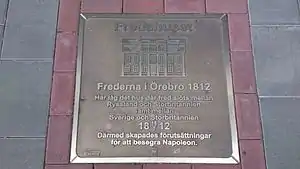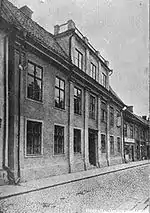| Treaty of Peace, Union, and Friendship, between His Britannic Majesty and the Emperor of all the Russias Treaty of Peace, Union, and Friendship, between His Britannic Majesty and the King of Sweden | |
|---|---|
 Memorial plate from 2012 about the Treaty of Örebro 1812 | |
| Type | Bilateral treaty |
| Signed | 18 July 1812 |
| Location | Örebro, Sweden |
| Original signatories | |
| Ratifiers |
|

The building in Örebro where the treaties were signed in 1812
Two Treaties of Örebro[1][lower-alpha 1] were signed on the same day, 18 July 1812, in Örebro, Sweden. Negotiated by the British minister-plenipotentiary in Sweden, Edward Thornton, they formally ended the Anglo-Russian War (1807–1812) and the Anglo-Swedish War (1810–1812), neither of which had seen serious military conflict.[2][3]
Notes
- ↑ the full names being the Treaty of Peace, Union, and Friendship, between His Britannic Majesty and the Emperor of all the Russias and the Treaty of Peace, Union, and Friendship, between His Britannic Majesty and the King of Sweden
Footnotes
- ↑ The treaties were drawn up in French, the lingua franca of diplomacy at that time. Neither the original French nor the official English translation used a diacritic mark when spelling Örebro and so the official name is "Treaty of Orebro" (Great Britain Foreign and Commonwealth Office 1841, p. 13; Hansard 1812, pp. cols. 174, 175).
- ↑ Great Britain Foreign and Commonwealth Office 1841, pp. 13–17.
- ↑ Hansard 1812, pp. col. 174–177.
References
External links
 Works related to Treaty of Orebro (Britain and Russia) at Wikisource
Works related to Treaty of Orebro (Britain and Russia) at Wikisource Works related to Treaty of Orebro (Britain and Sweden) at Wikisource
Works related to Treaty of Orebro (Britain and Sweden) at Wikisource
This article is issued from Wikipedia. The text is licensed under Creative Commons - Attribution - Sharealike. Additional terms may apply for the media files.